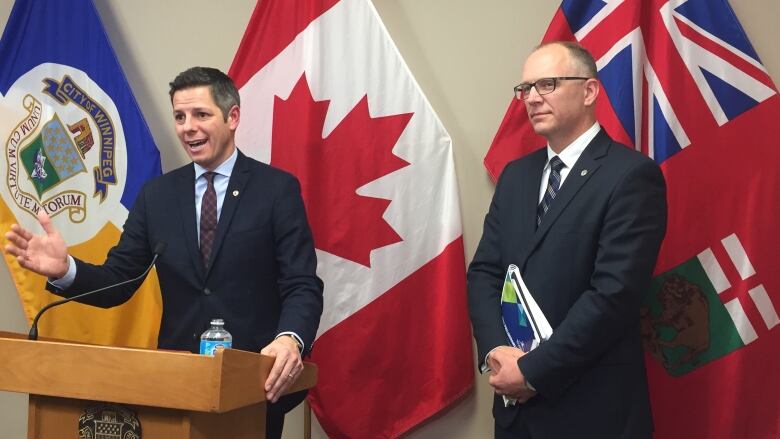Echoes from Katz and Selinger in city budget
Winnipeg somehow spending less on infrastructure despite tax hikes dedicated to infrastructure

As a progressive politician with a strong urbanist streak, Winnipeg Mayor Brian Bowman resembles colleagues such asCalgary MayorNaheed Nenshi, Edmonton's Don Iveson and Vancouver's Gregor Robertson.
But asa Manitoba politician with a revenue problem,he also bears some similarities toformer premier Greg Selinger and former mayor Sam Katz.
In 2013, Selinger incurred the wrath of voters for raising the provincial sales tax by one percentage point after pledging not to do so. Butthe broken promise paled in comparison to the way the NDP governmentmisrepresentedthe purpose of its PST hike.
On provincial budget day in 2013, Selinger promised all the proceeds from thathike $198.5million during that first fiscal year would be used pay for infrastructure such as flood-mitigation efforts.
Unfortunately for the former premier, budget documents clearly illustrated provincial spending oninfrastructure would onlygoup $80 million. The remaining $118.5 million worth of new revenuewas used to backfill the provincial budget.
The very same trick was employed on a much smaller scale by Katz in 2011. That budget year, the city hiked frontage levies in order to raise $14.4 million and promised all of this newmoney would be used to boost infrastructure spending.
Of course, budget documents belied the claim. In 2011, Winnipeg actually reduced its road-renewal budget by $15.1 million.
Flash forward to Tuesday, when Bowman unveiled a Winnipeg budget with a 2.33-per-cent property tax hike. This year, just like last year, the mayor said two of those percentage points would be dedicated to road renewals.
That means the city's road-renewal budget should go up $11 million this year. But it is not.
Winnipeg's road-renewal funding for 2017 will be $105million, an increase of $19,000 over the 2016 road-renewal budget.
At an auto dealer, you might be able to buy a Hyundai Elantra for $19,000. But that kind of money won't pave more than a few centimetres of road.
More importantly, $19,000 is clearly less than $11 million. The City of Winnipeg plans to use this money, purportedly dedicated for local and regional street renewals, for some other aspect of its budget.
That other aspect is not infrastructure. Tax-supported infrastructure spending is going down in 2017. This year, the city is spending$369 million on infrastructure that is not financed through water-and-sewer bills. Next year, that number will be $318 million, a drop of $51 million.
Speaking to reporters, Bowman claimed infrastructure funding is actually rising next year. When asked to explain the mayor's claim which is not supported by budget documents a senior city official suggested the 2017 capital budget is higher than it was projected to be last year.
But wait, there's more. The amount of actual money dedicated to infrastructure, as opposed to borrowed money or gifted cash, is going down in 2017.
Next year, the city plans to transfer $55.6 million from the operating budget to the capital budget. That's a drop of $19.6 million from 2016.
Increased federal and provincial fundingappears to be making this move possible, charges Transcona Coun. Russ Wyatt.
"When the feds figure this out, they're not going to be happy," Wyatt said Tuesday in a telephone interview. "The city isplaying with fire. When you do something like this, you're bound to have acredibilitygap, with politicians and with the people."
While Wyatt is a frequent critic of Mayor Bowman, he has some historyon the infrastructure file. Former mayor Katz tasked Wyatt tocome up with a sustainable means of funding road renewals in the long term.
The Transcona councillor, along with other city officials, came up with the annual two-percentage-point tax hikes that were supposed to ratchet up road-renewal spending every year.
"Now it's flatlinedlike a dead patient," Wyatt said, complaining the city is spending money on frivolous projects instead, such as the $5.3-million Tache Promenade, which he described asa "selfie-portrait deck on the side of the Red River" for St. Boniface Coun. Matt Allard.
OK, so Wyatt probably won't vote for the 2017 budget. But it's bound to be more acceptable to him and others than the budgets coming down the road.
Right now, Winnipeggers are spending a little more for the same services every year. In future years, the deepening revenue crunch means residents of this city can expect to pay much more for even fewer services.
Brian Bowman is not the architect of thissituation. But he will be the mayor for no fewer than two more budget seasons, which are bound to be even more difficult.












_(720p).jpg)


 OFFICIAL HD MUSIC VIDEO.jpg)
.jpg)



























































































